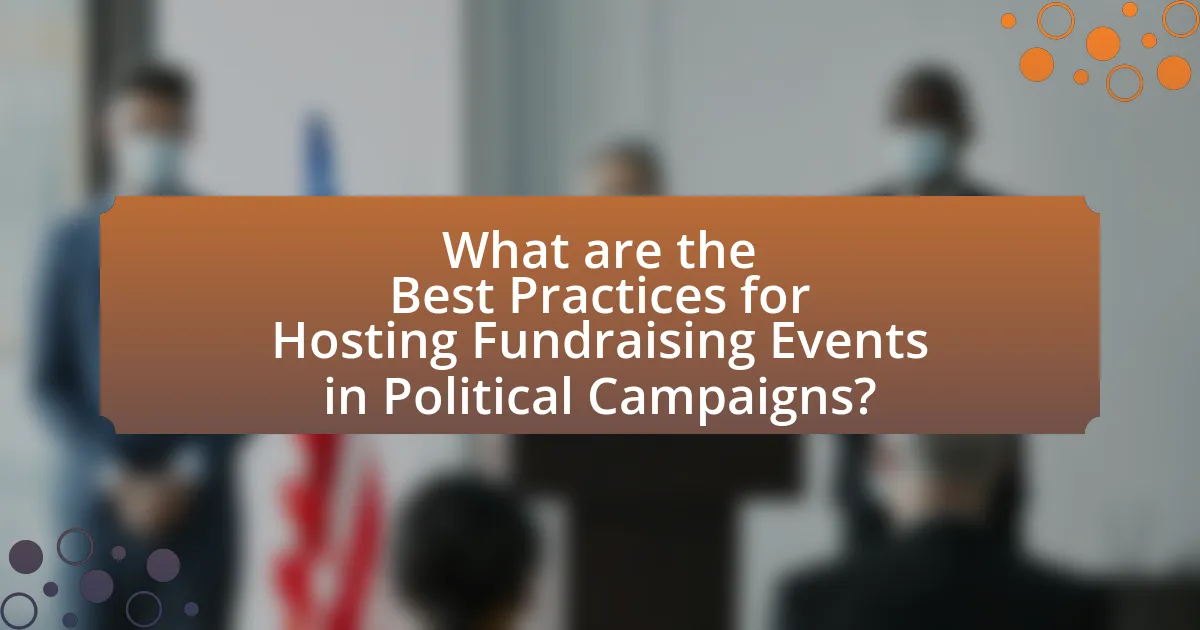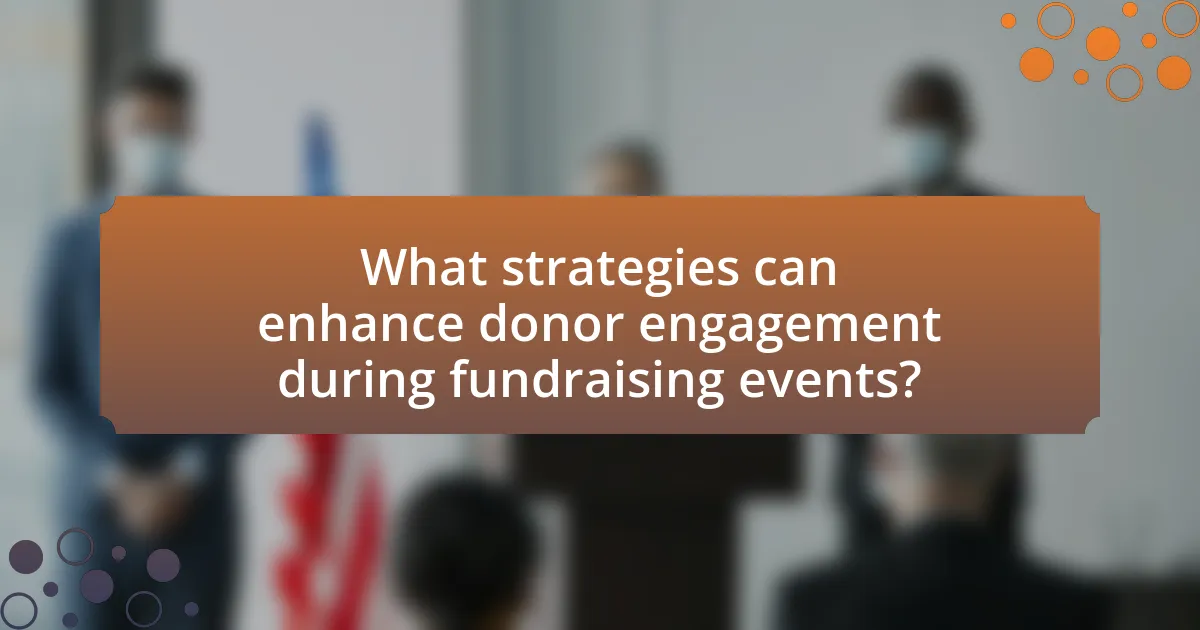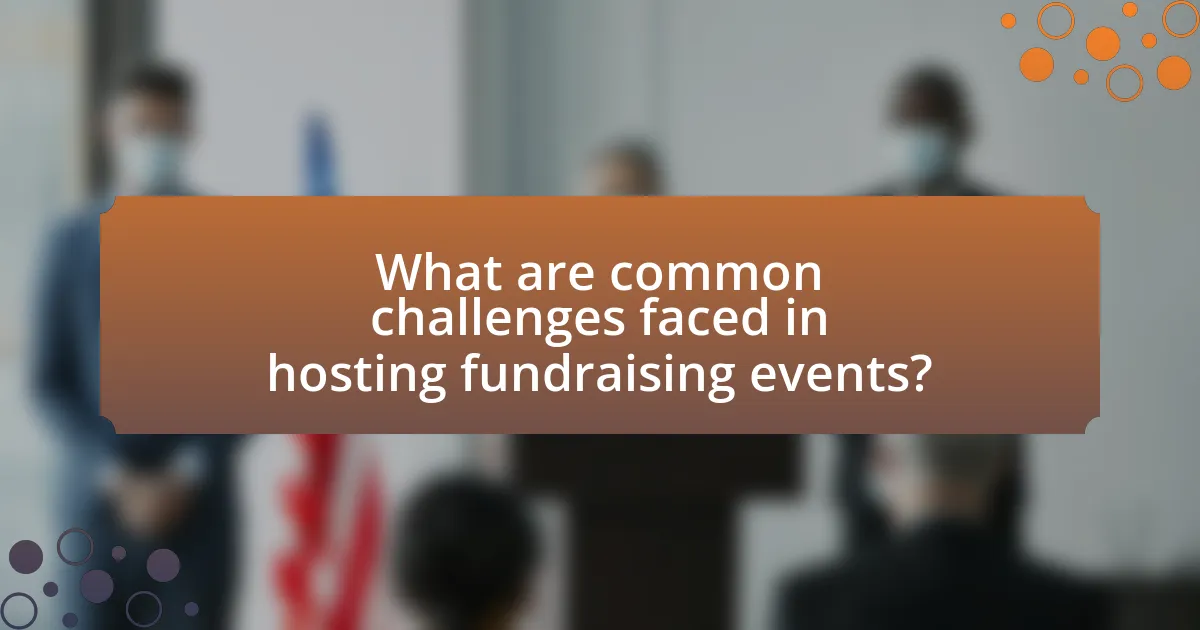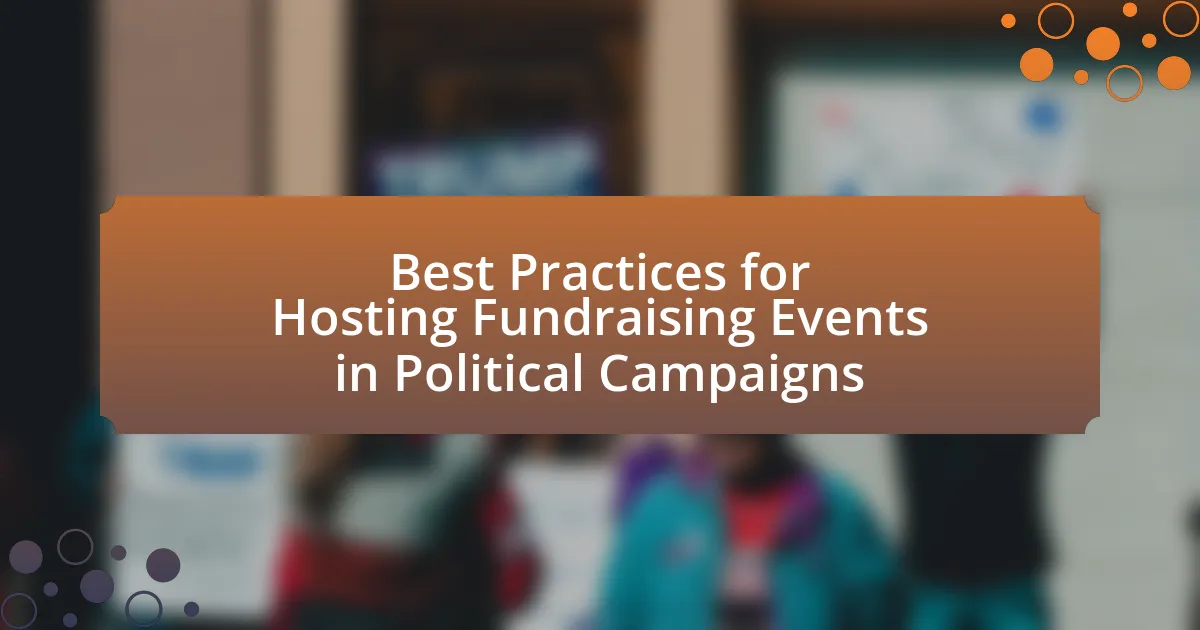The article focuses on best practices for hosting fundraising events in political campaigns, emphasizing the importance of careful planning, targeted outreach, and effective engagement strategies. It outlines key elements such as setting clear fundraising goals, selecting appropriate venues, and utilizing effective promotion methods to enhance visibility and attendance. The article also discusses the significance of donor engagement during events, the role of follow-up communication, and the challenges campaigns may face, including budget constraints and legal considerations. Additionally, it highlights various types of fundraising events, strategies for enhancing voter engagement, and the impact of storytelling on donor contributions.

What are the Best Practices for Hosting Fundraising Events in Political Campaigns?
The best practices for hosting fundraising events in political campaigns include careful planning, targeted outreach, and effective engagement strategies. First, campaigns should establish clear goals for the event, such as the amount of money to be raised or the number of attendees to engage. This helps in measuring success and aligning resources accordingly.
Next, selecting an appropriate venue is crucial; it should be accessible and reflect the campaign’s image. Additionally, campaigns should identify and invite key stakeholders, including potential donors, community leaders, and supporters, to maximize attendance and contributions.
Effective promotion through social media, email newsletters, and local media can enhance visibility and attract a larger audience. Engaging attendees during the event through speeches, personal stories, and interactive elements fosters a connection to the campaign and encourages donations.
Finally, follow-up communication post-event is essential to thank attendees and keep them informed about the campaign’s progress, which can lead to future support. These practices are supported by successful fundraising case studies, such as the Obama campaign’s use of grassroots events to raise significant funds in 2008, demonstrating the effectiveness of strategic planning and community engagement in political fundraising.
Why are fundraising events crucial for political campaigns?
Fundraising events are crucial for political campaigns because they generate essential financial resources needed for campaign activities. These events provide candidates with the funds necessary to cover expenses such as advertising, staff salaries, and outreach efforts. According to the Federal Election Commission, successful fundraising can significantly impact a candidate’s visibility and competitiveness, as campaigns with higher funding often have more effective outreach and engagement strategies. Additionally, fundraising events foster connections between candidates and their supporters, enhancing community involvement and loyalty, which can lead to increased voter turnout.
What role do fundraising events play in campaign financing?
Fundraising events are crucial for campaign financing as they generate significant monetary contributions that support various campaign activities. These events not only provide a platform for candidates to engage with potential donors but also create opportunities for networking and building community support. According to the Federal Election Commission, in the 2020 election cycle, candidates raised over $1 billion through fundraising events, highlighting their importance in securing financial resources necessary for campaign operations.
How do fundraising events enhance voter engagement?
Fundraising events enhance voter engagement by creating opportunities for direct interaction between candidates and constituents. These events allow voters to connect personally with candidates, fostering a sense of community and involvement in the political process. According to a study by the Pew Research Center, 62% of participants reported feeling more engaged in politics after attending a campaign event, highlighting the effectiveness of such gatherings in mobilizing voter interest and participation.
What types of fundraising events are most effective?
The most effective types of fundraising events include gala dinners, auctions, and online crowdfunding campaigns. Gala dinners typically attract high-net-worth individuals and can raise significant funds through ticket sales and sponsorships. Auctions, whether live or silent, create competitive bidding environments that can drive up donations for specific items or experiences. Online crowdfunding campaigns leverage social media to reach a broader audience, allowing for small contributions from many supporters, which can accumulate to substantial amounts. According to a study by the Association of Fundraising Professionals, events that combine social interaction with a clear fundraising goal tend to yield higher results, demonstrating the effectiveness of these event types in political campaigns.
What are the differences between online and in-person fundraising events?
Online fundraising events primarily occur through digital platforms, while in-person fundraising events take place at physical locations. Online events offer broader reach and accessibility, allowing participants from various geographical locations to join, whereas in-person events foster personal connections and networking opportunities among attendees. According to a 2021 report by the Fundraising Effectiveness Project, online fundraising grew by 21% in 2020, highlighting the increasing popularity of digital methods. In contrast, in-person events often generate higher immediate donations due to the social dynamics and engagement they create, as evidenced by a study from the Association of Fundraising Professionals, which found that in-person events typically yield 30% more funds than their online counterparts.
How can themed events attract more donors?
Themed events can attract more donors by creating a unique and engaging atmosphere that resonates with specific interests or causes. This approach enhances the emotional connection between attendees and the fundraising mission, making them more likely to contribute. For instance, a study by the Association of Fundraising Professionals found that events with a clear theme can increase participation rates by up to 30%, as they provide a memorable experience that encourages attendees to support the cause financially. Additionally, themed events often incorporate relevant activities, entertainment, and decor that align with the theme, further enhancing donor engagement and willingness to donate.
What key elements should be considered when planning a fundraising event?
Key elements to consider when planning a fundraising event include defining the target audience, setting a clear fundraising goal, selecting an appropriate venue, and creating a detailed budget. Understanding the target audience ensures that the event appeals to potential donors, while a clear fundraising goal provides direction and motivation. The venue must be accessible and suitable for the expected number of attendees, and a detailed budget helps in managing expenses effectively. According to a study by the Association of Fundraising Professionals, events that have a well-defined goal and budget are 30% more likely to meet their fundraising targets.
How do venue selection and logistics impact event success?
Venue selection and logistics significantly impact event success by influencing attendee experience, accessibility, and overall engagement. A well-chosen venue enhances the atmosphere, aligns with the event’s purpose, and accommodates the expected number of guests, which can lead to higher attendance rates. For instance, a study by the Event Marketing Institute found that 74% of attendees are more likely to engage with an event if the venue is appealing and accessible. Additionally, effective logistics, including transportation, setup, and timing, ensure that the event runs smoothly, minimizing disruptions that could detract from the experience. Research indicates that 80% of event planners believe that logistics are crucial for achieving event objectives, highlighting their role in facilitating a seamless experience that fosters donor engagement and support in political fundraising campaigns.
What is the importance of setting a clear fundraising goal?
Setting a clear fundraising goal is crucial because it provides direction and focus for the campaign’s fundraising efforts. A defined goal allows campaign organizers to create targeted strategies, allocate resources effectively, and measure progress. Research indicates that campaigns with specific fundraising targets are more likely to achieve their financial objectives, as they can motivate donors and volunteers by clearly communicating the purpose and urgency of the fundraising efforts. For instance, a study by the Nonprofit Research Collaborative found that organizations with specific fundraising goals raised 30% more than those without defined targets.
How can campaigns effectively promote their fundraising events?
Campaigns can effectively promote their fundraising events by utilizing targeted digital marketing strategies, including social media advertising, email campaigns, and influencer partnerships. These methods allow campaigns to reach specific demographics, increasing engagement and attendance. For instance, a study by the Pew Research Center indicates that 69% of adults in the U.S. use social media, making it a powerful platform for event promotion. Additionally, personalized email outreach has been shown to yield higher open and click-through rates, enhancing the likelihood of participation. By combining these strategies, campaigns can maximize their visibility and fundraising potential.
What channels are most effective for event promotion?
Social media platforms, email marketing, and local media are the most effective channels for event promotion. Social media allows for targeted outreach and engagement, with platforms like Facebook and Instagram enabling event pages and advertisements that can reach specific demographics. Email marketing provides a direct line to supporters and potential attendees, allowing for personalized invitations and reminders. Local media, including newspapers and radio stations, can amplify reach through community announcements and event coverage, enhancing visibility among local constituents. According to a study by Eventbrite, 70% of event attendees discover events through social media, highlighting its effectiveness in promoting events.
How can social media be leveraged to increase attendance?
Social media can be leveraged to increase attendance by creating targeted promotional campaigns that engage potential attendees. Utilizing platforms like Facebook, Twitter, and Instagram allows campaign organizers to reach specific demographics through tailored ads and organic posts, which can significantly boost visibility. For instance, a study by the Pew Research Center found that 69% of adults in the U.S. use social media, indicating a vast audience that can be tapped into for event promotion. Additionally, sharing engaging content such as videos, testimonials, and event countdowns can create excitement and encourage sharing, further amplifying reach.

What strategies can enhance donor engagement during fundraising events?
To enhance donor engagement during fundraising events, organizations should implement personalized communication strategies. Personalized outreach, such as tailored invitations and follow-up messages that reference past contributions or specific interests, significantly increases donor connection and participation. Research indicates that personalized communication can boost donor retention rates by up to 50%, as it fosters a sense of belonging and appreciation among donors. Additionally, incorporating interactive elements, such as live polls or Q&A sessions during the event, encourages active participation and makes donors feel valued. Engaging storytelling that highlights the impact of donations can also resonate with attendees, reinforcing their commitment to the cause.
How can campaigns create a compelling narrative for their events?
Campaigns can create a compelling narrative for their events by clearly defining their mission and connecting emotionally with their audience. This involves crafting a story that highlights the campaign’s values, goals, and the impact of the event, making it relatable and engaging. For instance, using personal anecdotes or testimonials from supporters can illustrate the campaign’s significance and foster a sense of community. Research shows that narratives that evoke emotions can increase engagement and support; a study by the University of Pennsylvania found that emotionally charged stories are more likely to be shared and remembered. By integrating these elements, campaigns can effectively resonate with attendees and motivate them to contribute.
What storytelling techniques resonate with potential donors?
Emotional storytelling techniques resonate strongly with potential donors. These techniques include personal narratives that highlight individual experiences, showcasing the impact of donations through real-life stories, and using vivid imagery to evoke empathy. Research indicates that emotional appeals can increase donor engagement; for instance, a study by the Stanford Social Innovation Review found that stories that connect emotionally can lead to a 20% increase in donations. By focusing on relatable characters and clear outcomes, fundraisers can effectively communicate their mission and inspire potential donors to contribute.
How can personal testimonials enhance the fundraising appeal?
Personal testimonials enhance fundraising appeal by providing authentic, relatable narratives that resonate with potential donors. These testimonials create an emotional connection, making the cause more tangible and compelling. Research indicates that emotional storytelling can increase donor engagement and willingness to contribute; for instance, a study by the Stanford Social Innovation Review found that narratives can boost donations by up to 20%. By showcasing real experiences and outcomes, personal testimonials effectively illustrate the impact of contributions, thereby motivating individuals to support the fundraising efforts.
What role does follow-up communication play after fundraising events?
Follow-up communication plays a critical role in reinforcing relationships with donors after fundraising events. It serves to express gratitude, provide updates on the impact of their contributions, and encourage ongoing engagement with the campaign. Research indicates that personalized follow-up messages can increase donor retention rates by up to 50%, highlighting the importance of maintaining connections post-event. Effective follow-up can include thank-you notes, progress reports, and invitations to future events, all of which contribute to building a loyal donor base and fostering long-term support for political campaigns.
How can thank-you notes impact donor retention?
Thank-you notes significantly enhance donor retention by fostering a sense of appreciation and connection between the donor and the organization. When donors receive personalized thank-you notes, they feel valued and recognized for their contributions, which can lead to increased loyalty and a higher likelihood of future donations. Research indicates that organizations that express gratitude through thank-you notes experience a 20% increase in donor retention rates compared to those that do not. This demonstrates that effective communication and acknowledgment of support are crucial in maintaining long-term relationships with donors.
What strategies can be used to keep donors engaged post-event?
To keep donors engaged post-event, organizations should implement personalized follow-up communication strategies. Sending tailored thank-you messages that acknowledge each donor’s contribution fosters a sense of appreciation and connection. Additionally, providing updates on the impact of their donations through newsletters or social media keeps donors informed and involved. Research indicates that organizations that maintain regular communication with donors see a 40% increase in donor retention rates. Engaging donors through exclusive events or behind-the-scenes content can also enhance their connection to the cause, encouraging ongoing support.

What are common challenges faced in hosting fundraising events?
Common challenges faced in hosting fundraising events include securing adequate funding, attracting attendees, and managing logistics. Securing funding is crucial as it determines the event’s scale and effectiveness; many organizations struggle to find sponsors or donors willing to contribute. Attracting attendees is another significant hurdle, as events require effective marketing strategies to reach potential supporters, and low turnout can undermine fundraising goals. Additionally, managing logistics such as venue selection, catering, and technology can be complex and time-consuming, often leading to unforeseen issues that can disrupt the event. These challenges are frequently cited in studies on fundraising effectiveness, highlighting the need for thorough planning and resource allocation to ensure successful outcomes.
How can campaigns address budget constraints effectively?
Campaigns can address budget constraints effectively by prioritizing cost-efficient strategies such as leveraging digital platforms for outreach and engagement. Utilizing social media and email marketing reduces traditional advertising costs while reaching a broader audience. For instance, a study by the Pew Research Center indicates that 69% of adults in the U.S. use social media, making it a powerful tool for low-cost campaign promotion. Additionally, campaigns can focus on grassroots fundraising efforts, which often yield higher returns with lower expenses compared to large-scale events. According to the Federal Election Commission, small donations can significantly impact campaign financing, demonstrating that engaging local supporters can be both effective and economical.
What cost-effective alternatives exist for high-expense items?
Cost-effective alternatives for high-expense items in fundraising events include utilizing local venues instead of expensive banquet halls, sourcing in-kind donations for catering and services, and leveraging volunteer support for staffing needs. For instance, hosting events at community centers or parks can significantly reduce venue costs, while local businesses may provide food or services at a reduced rate in exchange for advertising or goodwill. Additionally, engaging volunteers can eliminate labor costs, allowing campaigns to allocate funds more effectively. These strategies not only lower expenses but also foster community involvement and support.
How can volunteer support mitigate financial challenges?
Volunteer support can mitigate financial challenges by reducing labor costs and enhancing resource allocation for fundraising events. When volunteers contribute their time and skills, organizations can allocate funds that would have been spent on paid staff towards other critical areas, such as marketing or venue costs. For instance, a study by the Corporation for National and Community Service found that volunteers provide an estimated economic value of $25.43 per hour, which can significantly lower operational expenses for political campaigns. This cost-saving effect allows campaigns to maximize their fundraising potential while minimizing financial strain.
What are the legal considerations for fundraising events?
Legal considerations for fundraising events include compliance with federal, state, and local laws governing campaign finance, which dictate contribution limits, reporting requirements, and permissible sources of funds. For instance, the Federal Election Commission (FEC) regulates contributions to political campaigns, requiring detailed reporting of donations exceeding $200. Additionally, organizations must ensure that fundraising activities do not violate tax laws, particularly regarding the tax-exempt status of non-profit entities, which can be jeopardized by excessive political activity. Furthermore, local regulations may impose specific permits or licenses for events, especially if they involve public spaces or alcohol sales. Compliance with these legal frameworks is essential to avoid penalties and ensure the integrity of the fundraising process.
What regulations must campaigns comply with during fundraising?
Campaigns must comply with federal, state, and local regulations during fundraising, which include limits on contributions, disclosure requirements, and prohibitions on certain sources of funding. The Federal Election Commission (FEC) enforces contribution limits, which vary based on the type of campaign and the donor’s status, ensuring transparency and fairness in the electoral process. Additionally, campaigns are required to report contributions and expenditures regularly, providing detailed information about donors and the amounts contributed, as mandated by the Federal Election Campaign Act (FECA). Violations of these regulations can result in penalties, including fines and legal action, reinforcing the importance of adherence to these rules for maintaining the integrity of the fundraising process.
How can campaigns ensure transparency in fundraising practices?
Campaigns can ensure transparency in fundraising practices by implementing clear reporting mechanisms and disclosing donor information. Establishing a system for regular financial reporting allows stakeholders to track how funds are raised and spent, while publicly sharing donor names and contribution amounts fosters accountability. According to the Federal Election Commission, campaigns are required to report contributions over a certain threshold, which promotes transparency and helps prevent corruption. Additionally, utilizing third-party platforms for fundraising can enhance credibility, as these platforms often have built-in transparency features that allow for real-time tracking of donations.
What practical tips can ensure the success of fundraising events?
To ensure the success of fundraising events, organizers should focus on thorough planning, effective marketing, and engaging activities. Thorough planning involves setting clear goals, budgeting accurately, and selecting an appropriate venue that aligns with the event’s purpose. Effective marketing includes utilizing social media, email campaigns, and community outreach to maximize attendance and awareness. Engaging activities, such as auctions, guest speakers, or entertainment, can enhance the experience and encourage donations. Research indicates that events with interactive elements can increase participant engagement and fundraising outcomes, as seen in studies by the Association of Fundraising Professionals, which highlight the importance of donor involvement in successful fundraising initiatives.
How can campaigns utilize feedback for future events?
Campaigns can utilize feedback for future events by systematically collecting and analyzing participant responses to improve planning and execution. This process involves using surveys, interviews, and social media engagement to gather insights on attendee experiences, preferences, and suggestions. For instance, a study by the Event Marketing Institute found that 70% of event organizers who implemented feedback mechanisms reported enhanced attendee satisfaction and increased participation in subsequent events. By integrating this feedback into future strategies, campaigns can tailor their events to better meet the needs of their audience, ultimately leading to more successful fundraising outcomes.
What are the best practices for event day management?
The best practices for event day management include thorough preparation, effective communication, and contingency planning. Thorough preparation involves creating a detailed schedule, assigning roles to team members, and ensuring all equipment and materials are ready before the event starts. Effective communication is crucial; it ensures that all staff and volunteers are informed about their responsibilities and can address any issues that arise promptly. Contingency planning is essential to handle unexpected situations, such as weather changes or technical difficulties, by having backup plans in place. These practices are supported by successful case studies in political fundraising events, where organized management directly correlates with increased attendee satisfaction and fundraising outcomes.
